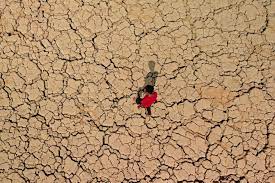Dr. Majid Rafizadeh
The climate crisis has posed several critical threats and inflicted crippling losses across the world, particularly in the Middle East. One of the important issues with the climate crisis is that when a sector in society is negatively impacted by climate change, it affects other parts as well since the various sectors are interconnected. For example, long periods of drought in some regions have a negative impact on food production, which will subsequently affect people’s health. This will likely put more pressure and strain on the healthcare system as well.
Climate change is not just linked to longer periods of droughts – it also causes more frequent and disastrous floods, as warmer air temperatures lead to more melting of glacier ice and warming of the oceans, along with rising sea levels. Additionally, it causes harm to animals, more wildfires, declining biodiversity, heatwaves, storms and tropical cyclones, and soil degradation, to name only a few problems. In the long term, if some of the damage, such as water scarcity and lack of agricultural resources, continues to increase to the extent that freshwater resources are depleted in some countries, this will have an impact on national security and political stability.
Devastating impacts can lead to an increase in human morbidity as well, due to “increased heat and infectious diseases, inequality and poverty rates, risk to water and energy security due to drought and heat, and reduced economic output and growth.” As the UN has pointed out, other harmful impacts of climate change are “unquantifiable losses and damages, particularly for many communities and countries in the developing world – loss of lives and livelihoods, as well as degradation of territory, farmland, cultural heritage, indigenous knowledge, societal and cultural identity, biodiversity, and ecosystem services.” As a result, damages and losses caused by climate change are not solely limited to non-economic factors. Economic losses include the cost of rebuilding communities and infrastructure, as well as the decreasing revenues in the agriculture industry. For instance, when it comes to the US, the total cost of weather/climate disaster events exceeds $2.5 trillion, according to the National Centers for Environmental Information.
Unfortunately, developing countries as well as communities with lower socio-economic classes, older people, women and children disproportionately experience the impacts of losses and damages caused by climate change. According to a recent study at Dartmouth College, global warming caused by only five countries, including the US, has caused $6 trillion in global economic losses, and those losses reportedly have not been “suffered equally – the burden has fallen disproportionately on low-income countries that have contributed the least to the problem.” In other words, climate change does not recognize borders and one country’s policies and actions can affect not only its own sectors, but also other countries’ as well.
It is also worth noting that the Middle East and North Africa is one of the most vulnerable regions when it comes to climate change. This is due to the dry or semi-dry environment of the region. The Middle East and North Africa have been particularly impacted by climate change since temperatures are rising almost twice as quickly as in other parts of the world, according to a report by the Cyprus Institute’s Climate and Atmosphere Research Center and the Max Planck Institute for Chemistry. Countries such as Iraq, Syria, Jordan and Iran have witnessed significant desertification. Water scarcity is another critical factor for the Middle East because of its rising population growth. The MENA region is already characterized as the most water-scarce region of the world. It is critical to point out that tackling the climate crisis requires that all countries, especially the developed ones, take action. This means that poorer countries need support in order to adapt and address the climate crisis.
Regional and global cooperation is extremely important. In the MENA, the Arab League can play a critical role through its work and collaboration with the UN, the EU and other regional or international organizations. There are already effective programs such as the Middle East Green initiative, which was launched in 2021 by Saudi Arabia. The initiative can amplify “impact in the global fight against climate change, while creating far-reaching economic opportunities for the region.”
When it comes to tackling the climate crisis, some of the most critical steps to take are reducing greenhouse gas emissions, through investments in efficient infrastructure, which reduces emissions, and by conserving water. The world is increasingly facing water stress or scarcity, with demand frequently being higher than supply in some areas. The UN estimated in 2016 that approximately two-thirds of the world’s population could be facing water shortages by 2025. This will also negatively impact the ecosystem. And a 2022 report by the Council on Foreign Relations highlighted that water stress can “differ dramatically from one place to another, in some cases causing wide-reaching damage, including to public health, economic development, and global trade. It can also drive mass migrations and spark conflict. Now, pressure is mounting on countries to implement more sustainable and innovative practices and to improve international cooperation on water management.”
In conclusion, to address climate change more effectively, regional and global organizations must collaborate more closely. Tackling the climate crisis is not only about protecting and preserving biodiversity and the planet, but it is also related to protecting our future and the coming generations.







